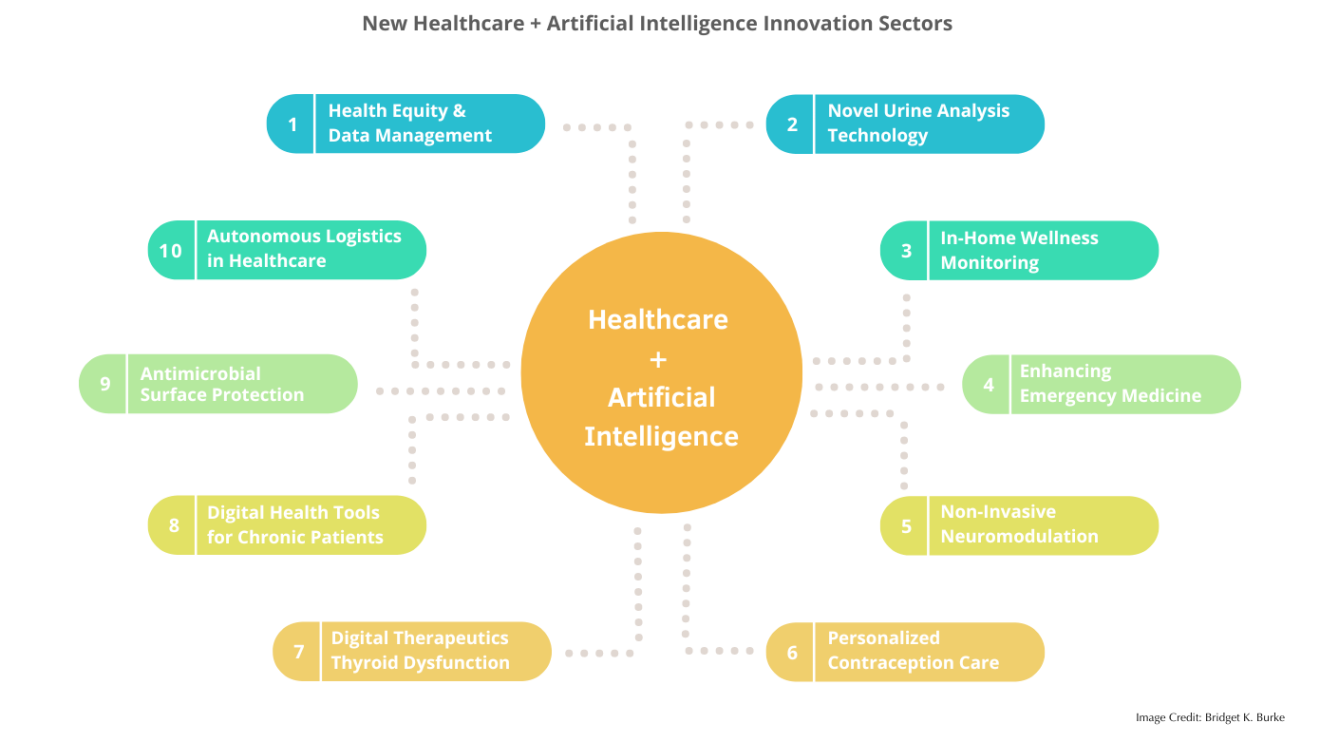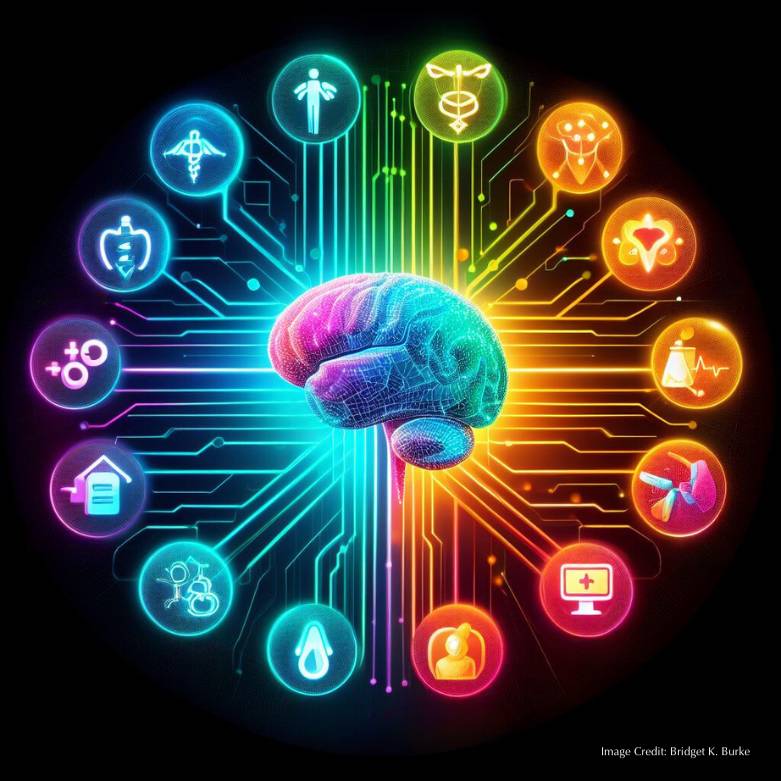Bridget K. Burke shares a dispatch from the 2023 TechCrunch Disrupt conference, where several of over 50 global HealthTech startups demonstrated the potential impact of Artificial Intelligence (AI) on healthcare accessibility, efficiency, and personalization. Her theories about future combinations of emerging technologies suggest the potential value of healthcare leaders being engaged, open-minded and forward-thinking about transforming care approaches together.
By Bridget K. Burke
The 2023 TechCrunch Disrupt conference made clear that we are now crossing the cusp of a revolution in the practice of medicine, one that will advance clinical safety, quality, and value. This year, over 50 global HealthTech startups showcased their unique visions of the future of healthcare. Their array of innovations showcased how Artificial Intelligence (AI) has taken on major roles across pressing healthcare challenges. These startups presented an imminent future of more accessible, efficient, and personalized healthcare. Engaging with these technologies isn’t merely an opportunity – it is calling on healthcare leaders to foster a more cohesive, efficient, and patient-centric healthcare ecosystem. I will explore how these startups’ novel innovations, and potential future-state synergies across them, are ushering in the Age of AI and new opportunities for health leaders to think differently about care discovery, delivery, measurement, and management.
Editor’s note: The following potential synergies between healthcare startups are the author’s theoretical examples of future-state shifts.
Advancing Healthcare Equity & Medical Research
A fusion of Alvee’s AI-driven health equity data management platform with Yuimedi’s data preprocessing technology could present a potent synergy for refined data management and analysis in healthcare. Alvee’s platform monitors and gauges health disparities across diverse populations, offering real-time insights to aid healthcare systems in promoting health equity. In addition, Yuimedi seeks to accelerate medical data utilization through its no-code NLP AI-based data cleaning application. This addresses a crucial step in the data analysis pipeline, aiming to ensure data accuracy and reliability, which are foundational for insightful analyses. The collaborative potential between Alvee and Yuimedi exemplifies how leveraging advanced technologies in tandem could offer a robust framework for healthcare data management, propelling the sector toward a more equitable and data-driven paradigm that advances patient care.
Patient-friendly, Non-Invasive Neuromodulation
Stimvia’s AI-powered, non-invasive neuromodulation system is a strong example of the advent of numerous innovative treatment modalities aimed at enhancing patient experience and outcomes. Its system targets overactive bladder (OAB) symptom alleviation and, unlike traditional neuromodulation therapies that require surgical electrode implantation, it delivers targeted stimulus without surgery. Beyond OAB, the non-invasive neuromodulation principle demonstrated by Stimvia’s system hints at a broader spectrum of applications in managing chronic diseases by modulating nerve activity. By reducing the invasiveness of treatments, not only could the patient experience be significantly enhanced, but the door to treating a variety of chronic conditions in a less intimidating manner is also opened, suggesting potential for improved patient quality of life and broader chronic disease management.
Bridging Physical and Technological Gaps in Chronic Care Management
Aviant’s drone delivery service, alongside BetterMedics’ remote monitoring platform, could unite autonomous logistics and digital health tools in transforming chronic patient care, particularly in remote or underserved regions. Aviant’s drones deliver essential medical supplies, which is crucial for timely management of chronic conditions – and which has the potential to overcome logistical barriers ranging from traffic congestion to earthquakes or floods. Concurrently, BetterMedics’ platform is designed to facilitate fast and efficient digital interactions between healthcare clinicians and patients. It incorporates medication adherence tracking, virtual consultations, and real-time health monitoring. While neither of these startups is AI-based, it is important to consider their innovations alongside AI innovation, as synchronizing the logistics and remote monitoring ecosystems could not only address geographical and time constraints but could also amplify the efficiency and responsiveness of chronic care management – especially in hard-to-reach areas where access to medical resources and continuous monitoring are paramount for improving healthcare outcomes.
Pioneering Digital Therapeutics & Patient-Centric Care
Thyroscope and Duly encapsulate the evolving narrative toward digital therapeutics and personalized, patient-centric care. Thyroscope’s tailored AI-supported digital service for individuals with thyroid dysfunction blends bio-signal analysis via wearable devices with symptom surveys to personalize disease risk monitoring. Duly’s AI-assisted platform, in turn, focuses on personalized contraception care, providing a secure and judgment-free space for users to consult healthcare professionals, obtain the knowledge needed to make informed decisions, and access crucial reproductive health supplies. A synergy of Thyroscope and Duly’s platforms could demonstrate the transformative potential of digital therapeutics to empower individuals with the tools and knowledge to manage their health, facilitating more proactive, personalized, patient-centric care.
AI-Enhanced Emergency Care in Settings with Lower HAIs
Technology innovations will most certainly layer together to create safer, more efficient emergency department experiences. Consider a person who arrives at their nearest ED after a stroke: For them, AvantGuard’s novel manipulation of chlorine could provide future antimicrobial protection against healthcare-acquired infections associated with skin contact, medical devices or other surfaces that can become contaminated in the ambulance, the ED waiting room or a treatment area. And once this person is examined, CerebraAI could be another outcomes facilitator: Its innovative use of Generative AI enhances hypo-dense brain tissue detection through Non-Contrast CT. The approach aims to improve diagnostic accuracy and speed, which are crucial for triggering an immediate intervention in cases like stroke or traumatic brain injury, and which could be particularly valuable in community and rural hospitals by speeding up a decision whether to transfer a patient to a higher-acuity center.

Innovative Athlete Health & Performance Insights
Plantiga’s AI-powered shoe insole sensor system unveils a new frontier in athlete monitoring and has the potential to combine with other health monitoring technologies to provide a more comprehensive athlete health management solution. It harnesses artificial intelligence to analyze biomechanical metrics, and it provides actionable insights into athletes’ physical state and performance. This real-time monitoring permits instant feedback, aiding athletes and coaches in making informed decisions, whether adjusting training protocols or pinpointing medical intervention necessities. Beyond the athletic realm, Plantiga has exhibited success in identifying gait anomalies in people with Parkinson’s disease, reflecting the technology’s broader healthcare applicability.
Harnessing In-Home Technologies for Personalized, Proactive Monitoring
A melding of Toi Labs’ wellness monitoring solutions with Uray’s urine analysis technology could show us a leap forward in preventive healthcare and early at-home detection. Toi Labs’ AI-enabled smart toilet integrates wellness monitoring into daily routines. It passively captures wellness indicators and offers insights that it says could flag early signs of health issues, creating an unobtrusive health monitoring experience. In parallel, Uray’s novel, reagent-free, AI-empowered urine analysis method is capable of analyzing 19 urine biomarkers. It facilitates the early detection and management of chronic diseases. A fusion of these technologies could not only simplify health monitoring but also empower individuals and healthcare providers with actionable insights, underscoring the transformative potential of integrating novel HealthTech solutions in fostering a preventive and personalized healthcare ecosystem.
The array of innovation displayed at TechCrunch highlights a dynamic and transformative artificial intelligence healthcare technology landscape, with a clear trend toward enhancing healthcare delivery and patient experience. The featured startups provide a glimpse into the broader transformation happening in healthcare. For healthcare leaders, staying abreast of the field provides the opportunity to participate in this transformation, to shape it, and to ensure it aligns with their goals. The call to action is unequivocal: to engage robustly with these emerging technologies, nurture collaborations, and advance a healthcare sector that is technologically advanced, more equitable, accessible, and responsive to patient needs. After all – this is the Age of AI.

